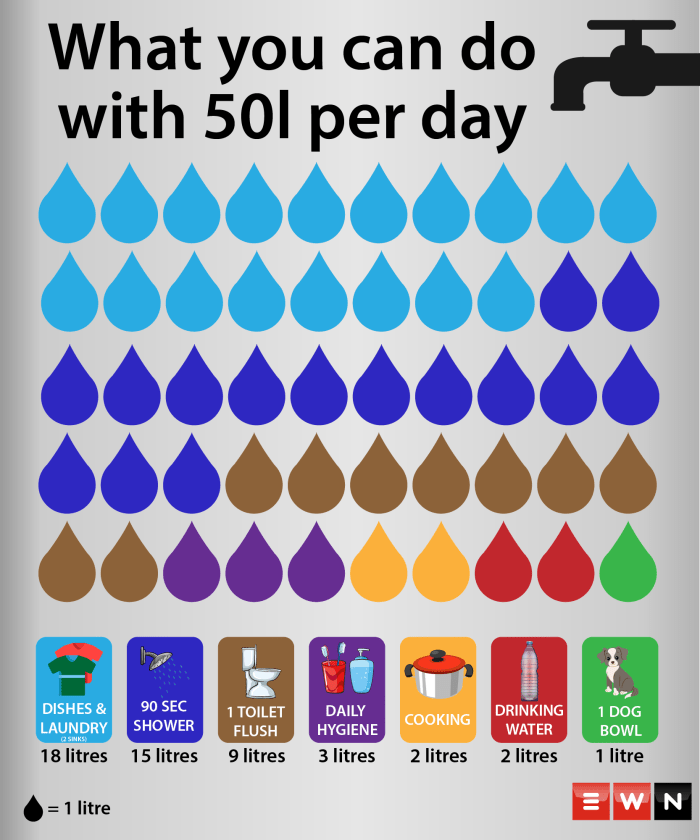Level 6B water restriction (50l/person/day) will be enforced as of 1 February, and with this in mind we thank the Muizenberg Lakeside Residents Association (MLRA) for the below adaptation of the WWF’s Wednesday Water File, “It’s Time to Prepare for Day Zero.
What will happen?
When you open your tap, nothing will come out. Municipal water will only be available to hospitals and clinics, stand-pipes in informal settlements and the 200 points of distribution where people can collect their allocated 25 litres per person per day.
Day Zero is not just about the inconvenience of queuing for water. Most schools will have to close if they don’t have their own safe supply from boreholes or rainwater tanks. Many businesses will not be able operate unless they can provide temporary (off-mains) toilets and drinking water.
What about the “new” water sources I’ve been hearing about?
At the moment, Day Zero is set for 21 April. The City’s dashboard shows that most new sources (groundwater, desalination and reclaimed water from waste water treatment plants) are about 50% complete and some are behind schedule. Initial sources are expected to be ready by April/May, with larger volumes coming online from groundwater and desalination in July/August.
All this “new” water will only be available after our taps run dry. In total, these new sources will provide 292 million litres of water per day; our current demand is 600 million litres per day. Simple maths tells us that the new water sources are not going to save us.
How long will Day Zero last?
It all depends on when and how much rain falls in the catchment areas. However, even if we get good rains, the dams will take months to recover.
Estimates are that we should prepare ourselves for Day Zero conditions to last for at least three months, possibly even six months.
Can we delay Day Zero until after the winter rains start?
It’s up to you, the average Capetonian. We have to drastically change our lifestyles. If you are one of 40% of Capetonians who are using 87 litres of water per day, you need to reduce that to 50 litres per day. If you are one of the 60% of Capetonians who are still not saving water – shame on you!
Let’s get creative and have fun sharing water-saving tips! In Muizenberg and Lakeside, we can “bath” by having a swim in the sea every day. A litre of fresh water to rinse off the salt afterwards, and you are clean and smiling because you had fun! Our long, thick hair takes quite a bit of water to wash and rinse – start a new fashion in headscarves!
On a more serious note, we need to rethink a lot of things. Many of us supply holiday accommodation – perhaps it is time to take a financial knock for the greater good. Those of us who wash plastic containers for recycling – can we do it more efficiently? These are just two examples; look closely at your lifestyle and see where you can adapt.
Many of us have benefitted from well points. A word of warning – the lack of rain over the last three years means that the water has much higher concentrations of sodium and chloride than previously. Do not drink this water unless you have had it tested by a reputable laboratory.
How can we prepare for Day Zero?
We need to look after each other. Get to know your neighbours and assist them where possible, especially the elderly and infirm. Could you help look after children whose schools are closed? Share information and tips with your friends and colleagues. You can start by printing this and sharing it with your neighbours!
If you can’t afford a rainwater tank, there are other affordable ways of harvesting rainwater, for example modifying your downpipes and catching the water in a wheelie bin. A plastic tap can also be added.
Have an emergency supply of drinking water on hand. Add a 5-litre bottle of water to your weekly shop, and store it in a cool, dark place. You may not stockpile municipal water.
All residents living in the Muizenberg, Lakeside, Marine Estate area and surrounds are encouraged to sign up with the MLRA, membership is only R100 per annum. Download a membership form here.
About MID:
The Muizenberg Improvement District [MID] is a geographic area where property owners have contracted to pay a levy to facilitate a joint effort by the City of Cape Town and the local community to ensure more effective management of public areas and to promote business confidence. The MID supplements normal municipal services provided by the City, using its funds to deal with public safety, enhance the environment and address social issues like vagrancy and finding workable solutions for the homeless. The Muizenberg Improvement District is a legal entity established under the City’s Special Rating Areas by-law and also governed by the South African Companies Act 2008.
Enquiries: manager@mid.org.za

